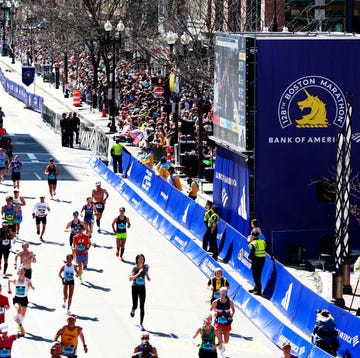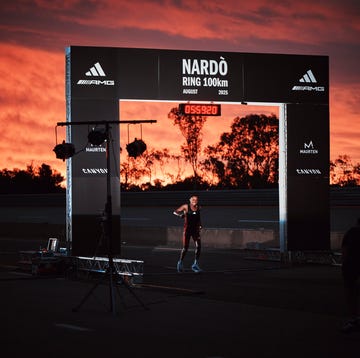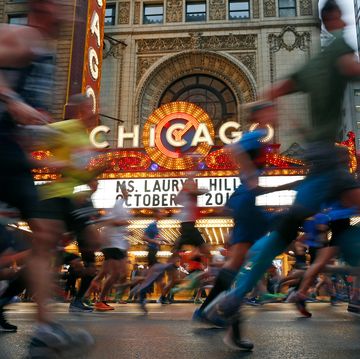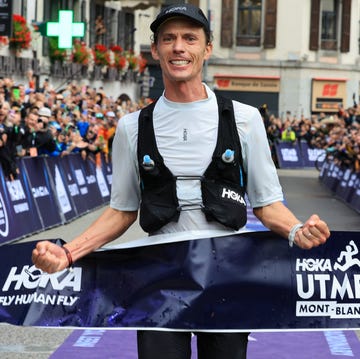Several months after injury forced her out of the Olympic Marathon Trials, Emma Bates was once again the top American at this year’s Boston Marathon. Although she led for most of the first 20 miles, she faded in the final 10K, finishing 12th in 2:27:14 (5:37 pace)—five minutes off her personal best of 2:22:10, which earned her fifth place here last year.
On the men’s side, CJ Albertson was the first U.S. finisher, placing seventh in a personal best of 2:09:53. Albertson’s fine run came just more than two months after he finished fifth at the U.S. Olympic Marathon Trials on February 3 in Orlando, Florida. Elkanah Kibet, who was fourth at the Marathon Trials, placed 14th in 2:12:32. Ryan Eiler was the third U.S. finisher, 15th in 2:14:22.
Albertson’s PR capped an admirable clustering of recent high-quality marathons. In addition to today and the Olympic Trials (the site of his previous personal best), he won marathons in 2:11 on consecutive weekends in December 2023.
Albertson, who famously led the 2021 Boston by more than 2 minutes at halfway, ran more conservatively early on this time. He was in 14th place at halfway, and then began to move up through the field. “I knew that if I closed the second half well, I would break 2:10,” Albertson told Runner’s World after the race.
He went from 11th at 20 miles to tenth at 23 miles to ninth at 40K, but he didn’t know what place he was in. “At around 24, 25 miles, based on the people I was catching, I knew I had to have gotten into the top ten,” Albertson said.
Behind Bates, Sara Hall—on her 41st birthday—finished 15th in 2:27:58; 2018 champion Des Linden, 40, was right behind her in 16th place, finishing her 11th Boston in 2:28:27.
Jenny Simpson, 37, ran 2:31:39 to place 18th and complete her first 26.2-mile effort. The world champion and Olympic bronze medalist at the 1500 meters had attempted to make her marathon debut at the Trials, but dropped out with muscle cramps at mile 18.
Bates and Hall both stayed with the large lead pack of 20-plus women through mile 15, reaching that mark in 1:23:11. Linden ran slightly behind until about mile 14, when she briefly took the lead before falling off the back again.
A speedy 5:14 on the downhill 16th mile, heading into Newton, caused both Bates and Hall to slip away from the leaders. Bates caught back up by the next mile marker, regaining the lead for the next three miles.
“There are so many people in this race I look up to”—including eventual winner Hellen Obiri and Edna Kiplagat, who placed third, both from Kenya—“so I was trying to key off of them waiting for the move to happen,” Bates said after the race. “I knew that there was going to be a big move, but I didn’t know when and so I was just trying to stay within myself and be in my own rhythm.”
The move finally came on the uphill between miles 20 and 21, and Bates fell behind again, permanently. She covered the final 10K in 36:08, a 5:49 pace. But as she watched Hall and Linden come in behind her, the three embraced, then posed together. “To see them come across the line and want to take photos with me, I’m still starstruck," Bates said. "It was a special day in that regard.”
Overall, the U.S. pro fields were a little weaker than usual. Most top American marathoners ran the Olympic Trials in February, and few attempted the quick turnaround that Hall, Linden, Albertson, and Kibet handled so adeptly in Boston.

Cindy is a freelance health and fitness writer, author, and podcaster who’s contributed regularly to Runner’s World since 2013. She’s the coauthor of both Breakthrough Women’s Running: Dream Big and Train Smart and Rebound: Train Your Mind to Bounce Back Stronger from Sports Injuries, a book about the psychology of sports injury from Bloomsbury Sport. Cindy specializes in covering injury prevention and recovery, everyday athletes accomplishing extraordinary things, and the active community in her beloved Chicago, where winter forges deep bonds between those brave enough to train through it.
















